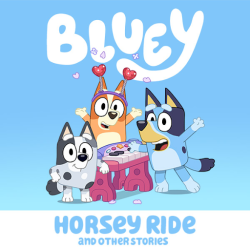Unpacking the Phenomenon of Bluey
In a landscape saturated with cartoons for kids, Bluey distinguishes itself by masterfully combining humor, warmth, and a celebration of creative play. This Australian series follows the Heeler family, centered around the energetic pup Bluey and her adventures in suburban Brisbane. Through the eyes of our six-year-old protagonist and her band of family and friends, we embark on an exploration of life's simplicities and the complex emotions tied to growing up. But what elevates Bluey above the everyday children's show?
It's not just the joyful wit or the cleverly embedded life lessons that capture our attention, but the revolutionary depiction of Bandit, the father figure who submerges himself entirely in the world of play. Bluey has not only won over the hearts of its youngest audience members but also that of parents and caregivers who find themselves reflected, for better or worse, in its narratives. Is it the magic of the show's relatability or the sting of its idealized parenting that keeps audiences hooked? We examine the ups and downs of this cultural movement.
The Many Facets of Bluey's Narrative Playground
The accolades for Bluey are as numerous as the games the Heeler family plays, but no show is without its critiques. While the series has been lauded for its positive family dynamics and innovative take on children's storytelling, it sets a gold standard in playtime engagement through Bandit's character. This portrayal, while endearing, inadvertently sets an almost unattainable bar for parental involvement. Bandit's unwavering patience and creativity in play leaves some parents feeling inadequate in comparison. The show, in all its brilliance, might inadvertently layer on the pressure for parents striving to match its exemplary paternal figure.
Furthermore, while the series thrives on celebrating the ordinary, some viewers have identified a lack of diversity in its casting. This critique suggests a missed opportunity for Bluey to reflect a more varied representation that mirrors its global audience. The focus on positive attributes could also be viewed as a missed chance to address and resonate with the imperfect realities of family life in its many forms.
Despite these concerns, Bluey continues to thrive because of its ability to evoke nostalgia for the simplicity of childhood play in a mature audience, while simultaneously enrapturing the younger demographic with its sincerity and fun. The series' creators' resolve to maintain the Australian accent and local flavor for its international audience is a bold statement of cultural pride, adding to the show's unique charm.
Reflecting Viewer Sentiments and the Impact of Bluey
For a show that seems to effortlessly dance across the lines of entertainment and education, the viewer impressions have been overwhelmingly positive. Fans across the globe eagerly await the streams of Bluey's latest episodes, sharing stories of how the Heeler family has become an integral part of their own family routines. Parents swap tales of their attempts at emulating the show's imaginative games, cementing Bluey's role in bringing families together through shared experiences both on and off-screen.
Despite parental self-doubt stirred by Bandit's super-dad image, many find that the show encourages them to engage more profoundly and thoughtfully with their children. The occasional discussions around the show's portrayal of diversity and parenting standards spark valuable debates amidst the laughter and lightness, suggesting that Bluey does more than entertain; it's a catalyst for conversation and reflection.
In essence, the Heeler family's adventures resonate with a universal rhythm of family life, love, and the enchanting labor that is raising children. Bluey may not have perfected every aspect of its presentation, but it has succeeded in capturing the essence of childhood and parenting in a way that feels true, tender, and sometimes all too real. As viewers continue to follow Bluey and her family, they do so with an understanding of the show's high points and its imperfections, much like the ebb and flow of their own family experiences.





